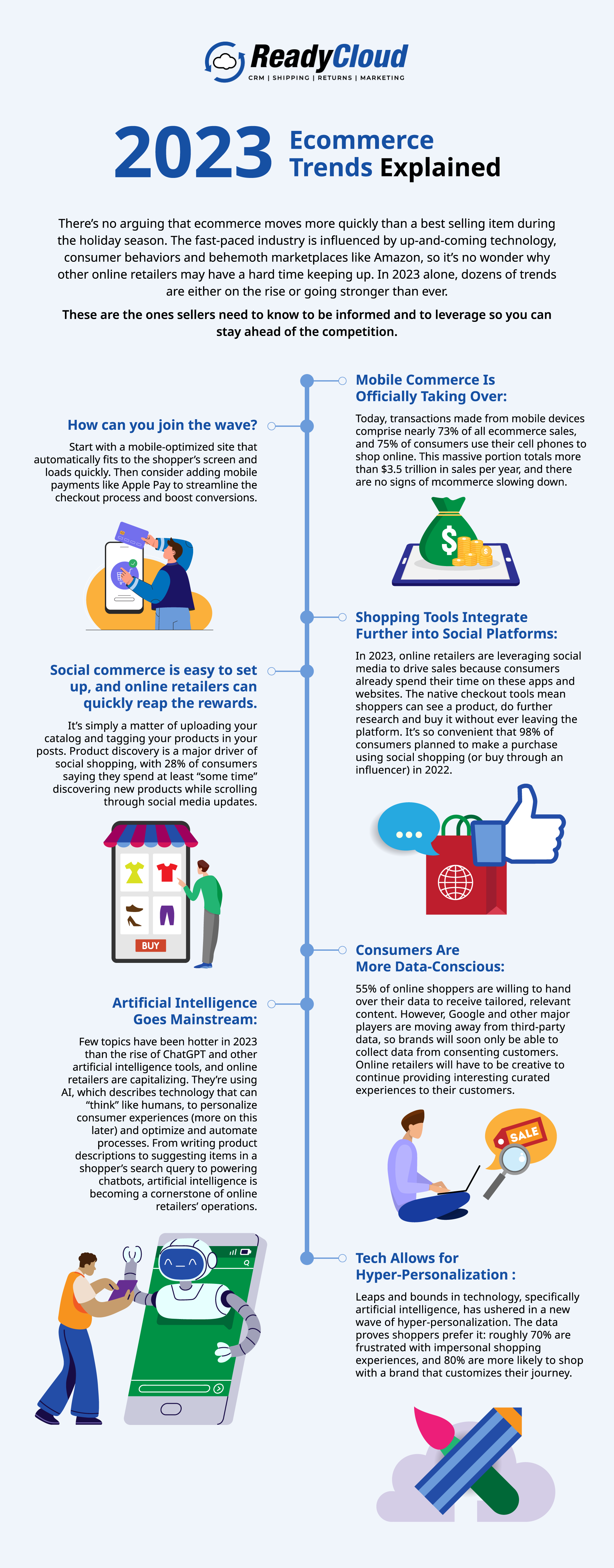5 Ways to Level Up Your Online Store’s Customer Service
Delivering exceptional customer service in ecommerce isn’t just a nicety; it’s a necessity. As online retailers, your success hinges on not only the quality of your products but also the entire shopper experience… or the customer journey from click to buy. From the first click on your website to the final delivery, each touchpoint with a customer presents an opportunity to build trust, foster loyalty, and boost sales.
Today we’ll explore five effective strategies tailored for online retailers to improve customer service. Whether you’re a seasoned ecommerce entrepreneur or just launching your online store, these tactics will help you elevate your customer service game and stand out in a competitive digital marketplace.
Why Does Customer Service Matter?
Customer service plays a pivotal role in the success and sustainability of online retail businesses because it’s a rare opportunity to interact with shoppers and provide them with the information they need to make a purchase or resolve an issue. By prioritizing customer service, you can improve brand trust, increase customer satisfaction, drive sales and position your online store for long-term prosperity.
Here’s a bit more detail on why customer service matters:
- Customer Retention: It’s far more cost-effective to retain existing customers than to acquire new ones. Exceptional customer service fosters loyalty, and loyal customers are more likely to make repeat purchases and become brand advocates, thus increasing your revenue over time.
- Reputation and Trust: Good customer service helps build a positive reputation for your brand, which is then passed on to others by satisfied customers. This word-of-mouth marketing can significantly impact your business’s credibility and trustworthiness.
- Competitive Advantage: The ecommerce landscape is fiercely competitive. Providing superior customer service sets you apart from competitors and gives customers a reason to choose your store over others.
- Customer Expectations: Today’s consumers have high expectations for online shopping experiences. They want responsive and accessible customer service. Meeting these expectations can result in increased sales and customer loyalty.
In short, customer service matters because your customers matter, and their experience with your brand determines whether or not your business thrives. So, how do you improve your customer service? We’re so happy you asked.
Strategy #1: Update Your Website
As the saying goes, “Sometimes the best offense is a good defense.” It’s true in ecommerce, where ensuring your website is up to snuff is the easiest way to reduce your store’s customer service inquiries altogether. Providing clear information that answers any would-be questions is always helpful, and it improves the shopper experience along the way.
Here are some tweaks you can make to your online store’s website today:
- Create Detailed Product Listings: Provide comprehensive product descriptions, specifications and high-quality images. This reduces (or, ideally, eliminates) the need for customers to contact you with questions about products and helps reduce cart abandonment, too.
- Ensure Easy Navigation: Make sure your website is easy to navigate, mobile-responsive and user-friendly to remove friction and reduce the likelihood of customer frustration.
- Add FAQs: Develop a comprehensive FAQ section that addresses common customer queries, so customers can find answers on their own instead of contacting support.
But even the most informative websites will still have visitors with questions or feedback, so the most important update you need to make is adding contact information in an easy-to-find spot so your customers know where to reach you.
Strategy #2: Develop a Clear Returns & Refunds Policy
Any online retailer knows about the inevitability of product returns, but did you know they’re a foolproof way to build a loyal customer base? Here’s the quick explanation: When shoppers see an online store with hassle-free returns, they feel more confident in their purchases, and they’re delighted when the returns process is convenient. It’s yet another example of how prioritizing the shopper experience leads to long-term gains.
A clear returns and refunds policy is where this all starts. Our guide to creating an effective ecommerce returns policy goes into deeper detail, but the process goes something like this:
- Determine the legal requirements of your area, including the rules and regulations that impact how you can handle returns and refunds.
- Decide which type of refund policy makes sense for your business: whether customers receive a partial refund, a full refund or store credit.
- Set a returns window, which establishes how long customers have to make returns after purchasing.
- Consider which types of items are eligible for returns.
Strategy #3: Enable Self-Service (Where Possible)
One of the often-overlooked gems in the realm of effective ecommerce customer service is self-service. Surprisingly, more than 60% of American consumers lean toward automated self-service methods, like those accessible through websites or mobile apps, for handling straightforward customer service tasks — and at least 77% of consumers have already tried them.
According to Forrester, customers tend to prefer knowledge bases for self-service. With a well-structured knowledge base, you can craft and share informative answers for customers, leading to a significant reduction in your customer support workload by at least 20%.
Customers often subconsciously seek the path of least resistance, so they will likely disengage if a process appears overly complex. Therefore, user-friendly self-service options are all the more crucial.
Strategy #4: Offer Multiple Communication Channels
In the digital age, customers expect flexibility and convenience in their interactions with online retailers. Providing multiple communication channels is a critical component of customer service that caters to diverse preferences and needs. The following is a healthy mix of channels your team can use for support and meet your customers where they are:
- Email: Email is the gold standard, a versatile channel for customer inquiries, order updates and general communication.
- Live Chat: Real-time chat support on your website lets customers get quick answers to questions or resolve issues immediately.
- Phone Support: Offering a dedicated phone line for customer inquiries can be essential for complex issues or for customers who prefer voice communication.
- Social Media: Many customers turn to social media platforms for support and inquiries, so pay attention to those DMs and comments.
- Messaging Apps: Popular messaging apps like WhatsApp, Facebook Messenger and even SMS can serve as convenient customer service channels, especially for mobile users.
- Community Forums: Encourage customers to engage with one another through community forums. These platforms can be valuable for sharing user experiences and solutions.
- Chatbots: Implement AI-powered chatbots to handle routine queries and provide immediate responses, freeing up human agents for more complex issues.
Strategy #5: Monitor Social Media
Not every disgruntled customer will write in with a complaint, but plenty of them will take to social media to spread the word about their perceived slights. That’s why it’s essential to monitor social media channels to gauge consumer sentiment and potentially resolve issues that haven’t yet been brought to your attention, and to improve the social proof of your brand.
It’s worth watching social media closely, as well as reviews on third-party websites. You may even consider a tool that aggregates social mentions of your brand or simply search for mentions yourself a few times each week. Be sure to respond promptly to both positive and negative comments to show your commitment to customer satisfaction.
Level Up Customer Service for Soaring Success
Remember, customers aren’t just seeking products; they’re seeking an experience. Elevate your customer service, and you’ll not only meet their expectations but also exceed them, ensuring lasting success in the dynamic landscape of online retail.

Share On:







